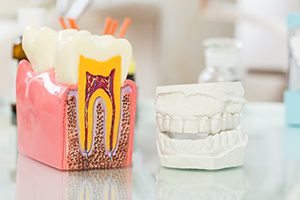
How the “Foods of Commerce” Have Shaped Us
From where we sit, getting dinner on the table is a piece of cake compared to what faced early man.
We “hunt” at the grocery store, “forage” in the produce department, and “stalk” hamburger joints. What we end up eating, though, may be far less nutritious than the food ancient man dished up.
How can this be? Well, we may be living longer and rarely do battle with tigers and bears for a meal, but our diet is changing the way we look. Our food choices are actually narrowing bone structure in the face, crowding teeth, and weakening jaw strength. For starters.
Nutritional sciences are just coming up to speed. In the 1930s, simple vitamins were a puzzlement. Research in the field, however, showed again and again that dental health in “primitive” populations is generally much higher than in “civilized” peoples. Not until isolated groups come in contact with processed foods do rampant decay and facial changes appear.
Weston Price, a dentist who studied natural diets worldwide, named highly refined sugars, refined flours, canned goods, vegetable fats, and polished rice as the culprits—the “foods of commerce.”
Another Price observation: he watched bugs ignore refined flour and thrive on raw grains—if the bugs aren’t interested, why are we?
Dinner Before Commerce
Some primitive diets—from strictly local food sources—seem to immunize against dental decay and promote facial strength.
In the Outer Hebrides, remote islands of western Scotland, the menu usually consists of: seafood, oat cake, oat porridge, marine plants and land vegetables. One common recipe called for a baked cod’s head stuffed with oatmeal and chopped cod liver. Yum.
And though oat cake may not be your cup of tea, in these people all teeth in the dental arch have erupted, even third molars. Jaws were free to move. And decay? Well, they left the discovery of decay to us!
The case is similar for many native peoples across the globe, from Native Peruvians in South America to the Maasai People in Africa.
But we’re the “lucky” ones. Today, the food industry has come up with a never-ending product line of nutritionally empty foodstuffs. New junk foods of commerce will automatically narrow the jaw, rot the teeth, and promise a long relationship with the orthodontist.
When “Stuffing Your Face” Takes on New Meaning
Processed foods ask less of us—less chewing, for sure—and our muscles and jawbone respond by weakening and shrinking dramatically.
So yes, stuff your face. But do so with foods that are, essentially, tougher to eat: raw fruits and vegetables, whole grains and legumes, fiber and more fiber. Especially for our children, let’s limit the foods of commerce. Those old fellows in the Outer Hebrides, eating their cod’s heads, knew a thing or two.

